8 books about Baldwin, Robert E.
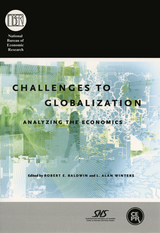
Challenges to Globalization
Analyzing the Economics
Edited by Robert E. Baldwin and L. Alan Winters
University of Chicago Press, 2004
People passionately disagree about the nature of the globalization process. The failure of both the 1999 and 2003 World Trade Organization's (WTO) ministerial conferences in Seattle and Cancun, respectively, have highlighted the tensions among official, international organizations like the WTO, the International Monetary Fund (IMF), the World Bank, nongovernmental and private sector organizations, and some developing country governments. These tensions are commonly attributed to longstanding disagreements over such issues as labor rights, environmental standards, and tariff-cutting rules. In addition, developing countries are increasingly resentful of the burdens of adjustment placed on them that they argue are not matched by commensurate commitments from developed countries.
Challenges to Globalization evaluates the arguments of pro-globalists and anti-globalists regarding issues such as globalization's relationship to democracy, its impact on the environment and on labor markets including the brain drain, sweat shop labor, wage levels, and changes in production processes, and the associated expansion of trade and its effects on prices. Baldwin, Winters, and the contributors to this volume look at multinational firms, foreign investment, and mergers and acquisitions and present surprising findings that often run counter to the claim that multinational firms primarily seek countries with low wage labor. The book closes with papers on financial opening and on the relationship between international economic policies and national economic growth rates.
Challenges to Globalization evaluates the arguments of pro-globalists and anti-globalists regarding issues such as globalization's relationship to democracy, its impact on the environment and on labor markets including the brain drain, sweat shop labor, wage levels, and changes in production processes, and the associated expansion of trade and its effects on prices. Baldwin, Winters, and the contributors to this volume look at multinational firms, foreign investment, and mergers and acquisitions and present surprising findings that often run counter to the claim that multinational firms primarily seek countries with low wage labor. The book closes with papers on financial opening and on the relationship between international economic policies and national economic growth rates.
[more]
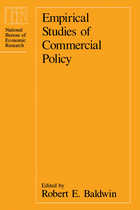
Empirical Studies of Commercial Policy
Edited by Robert E. Baldwin
University of Chicago Press, 1991
The need for careful research on trade policy is particularly acute, and this volume empirically addresses these and many other important issues. The contributors offer studies which integrate the institutional details of current trade policy with creative economic analyses.
Marked by a shift from a traditional reliance on simulation models, these papers take their inspiration from recent changes in the assumptions traditionally underlying research in international trade theory. No longer are government policies viewed as being somehow "given" to the researcher; in part 1, "Analyses with a Political Economy Perspective," four papers treat such policies as endogenous and explicable in terms of political economy. Neither are product and factor markets seen as perfectly competitive; instead, the three papers in part 2, "Trade Policy Effects under Imperfectly Competitive Market Conditions," assume that firms consider the actions of other companies when formulating their decisions. In part 3, "A New Measure of Trade Restrictiveness and Estimates of Trade Policy Effects with CGE Models," the first essay explores the quantitative restrictions on cheese to develop and implement a new model of restrictive trade. Two final contributions address problems for which simulation modeling is especially useful. The first considers the effectiveness of an import surcharge in reducing the U.S. trade deficit and the second treats the welfare effects of liberalization in South Korea where increasing returns to scale are significant
These innovative studies focus on economic behavior that will provide valuable insights for policymakers, academic economists, and students.
Marked by a shift from a traditional reliance on simulation models, these papers take their inspiration from recent changes in the assumptions traditionally underlying research in international trade theory. No longer are government policies viewed as being somehow "given" to the researcher; in part 1, "Analyses with a Political Economy Perspective," four papers treat such policies as endogenous and explicable in terms of political economy. Neither are product and factor markets seen as perfectly competitive; instead, the three papers in part 2, "Trade Policy Effects under Imperfectly Competitive Market Conditions," assume that firms consider the actions of other companies when formulating their decisions. In part 3, "A New Measure of Trade Restrictiveness and Estimates of Trade Policy Effects with CGE Models," the first essay explores the quantitative restrictions on cheese to develop and implement a new model of restrictive trade. Two final contributions address problems for which simulation modeling is especially useful. The first considers the effectiveness of an import surcharge in reducing the U.S. trade deficit and the second treats the welfare effects of liberalization in South Korea where increasing returns to scale are significant
These innovative studies focus on economic behavior that will provide valuable insights for policymakers, academic economists, and students.
[more]
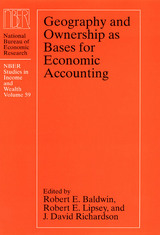
Geography and Ownership as Bases for Economic Accounting
Edited by Robert E. Baldwin, Robert E. Lipsey, and J. David Richardson
University of Chicago Press, 1998
Geography and Ownership as Bases for Economic Accounting provides a forum for leading specialists in trade and international economics to explore whether changes in the world economy have increased the usefulness of international accounts drawn up on the basis of ownership rather than on geography. The papers in this volume suggest that ownership-based national accounts are helpful in understanding trade and financial transactions among globalized enterprises. Individual chapters emphasize this perspective through accounting exercises, studies of individual countries, and studies of foreign direct investment and its relation to national economies.
This volume gives trade and international economists the data and resources to renew discussion of this timely issue.
This volume gives trade and international economists the data and resources to renew discussion of this timely issue.
[more]
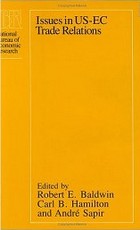
Issues in US-EC Trade Relations
Edited by Robert E. Baldwin, Carl B. Hamilton, and André Sapir
University of Chicago Press, 1988
A viable system of international trade requires the active support of both the United States and the European Community, the world's largest trading partners and, consequently, the primary forces shaping the post-World War II international trading regime. In recent years, however, a series of disagreements have threatened the consensus supporting that regime. Differences have arisen over the relation of trade policy to balance-of-trade deficits, the terms of and actual compliance with the current General Agreement on Tariffs and Trade, and the proper agenda and procedures to be adopted in future multilateral trade negotiations. These differences, if left unresolved, will further weaken an already strained system.
Issues in US-EC Trade Relations presents the results of a conference organized by the NBER and the Centre for European Policy Studies. In it, North American and European trade specialists offer theoretical, empirical, and historical analyses of some of the major issues on which American and Community officials disagree and also formulate realistic policies for settling present disputes. Contributors consider such topics as the legal aspects of trade between the two regions, agricultural policy, different ways the United States and members of the European Community use embargoes to attempt to induce foreign countries to change particular political actions, the growing trend toward protectionism and responses to this policy, international trade in services, and trade policy in oligopolistic environments. In most cases, each general subject is approached from both an American and a European perspective.
Issues in US-EC Trade Relations presents the results of a conference organized by the NBER and the Centre for European Policy Studies. In it, North American and European trade specialists offer theoretical, empirical, and historical analyses of some of the major issues on which American and Community officials disagree and also formulate realistic policies for settling present disputes. Contributors consider such topics as the legal aspects of trade between the two regions, agricultural policy, different ways the United States and members of the European Community use embargoes to attempt to induce foreign countries to change particular political actions, the growing trend toward protectionism and responses to this policy, international trade in services, and trade policy in oligopolistic environments. In most cases, each general subject is approached from both an American and a European perspective.
[more]
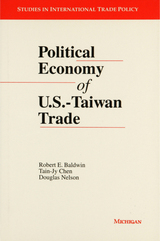
Political Economy of U.S. - Taiwan Trade
Robert Baldwin, Tain-Jy Chen, and Douglas Nelson, Editors
University of Michigan Press, 1995
Two key features of the remarkable economic growth in the newly industrializing countries of East Asia over the last quarter of a century are the role of exports of manufactured goods as the engine of this growth and the importance of the United States as a market for these exports. Political Economy of U.S.-Taiwan Trade analyzes the nature of the political and economic interactions, both domestic and international, which evolved between Taiwan and the United States in a manner that has enabled this growth to occur. In analyzing the various cooperative and conflicting trade policies pursued by the two countries over the last fifty years, the authors utilize a broad political economy framework. They first describe the nature and evolution of trade between Taiwan and the United States and discuss the major economic and political groups and institutions that shape trade policies in the two countries. In doing so, the role that trade has played both in Taiwan's development policies and in the international economic and political policies of the United States in the post-World War II period is analyzed. The various restrictions imposed by each country on the other's exports are examined, and the efforts to reduce these trade barriers are then discussed in detail. Particular attention is given to the series of bilateral negotiations in which the United States has used its dominant economic and political power to force Taiwan to open a number of its internal markets. The book will be of interest to both economists and political scientists specializing in international economics and international political relations. Area specialists focusing on the Far East will also find the book helpful. Robert E. Baldwin is Hilldale Professor of Economics, University of Wisconsin. Tain-Jy Chen is Research Fellow, Chung-Hua Institution for Economic Research. Douglas Nelson is Associate Professor of Economics, Tulane University. This title was formally part of the Studies in International Trade Policy Series, now called Studies in International Economics.
[more]
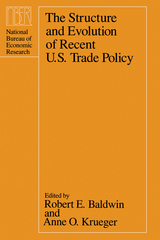
The Structure and Evolution of Recent U.S. Trade Policy
Edited by Robert E. Baldwin and Anne O. Krueger
University of Chicago Press, 1985
The trade policies addressed in this book have far-reaching effects on the world's increasingly interdependent economies, but until now little research has been devoted to them. This volume represents the first systematic effort to analyze specific U.S. trade policies, particularly nontariff measures. It provides a better understanding of how trade policies operate, how effective they are, and what their costs and benefits are to trading nations.
The contributors chart the history of U.S. trade policy since World War II, analyze industry-specific trade barriers, and discuss the effects of tariff preferences and export-promoting policies such as export credits and domestic international sales corporations (DISCs). The final section of essays examines the worldwide impact of import policies, pointing out subtleties in industry-specific policies and providing insight into the levels of protection in developing countries. The contributors blend state-of-the-art economics with language that is accessible to the business community, economists, and policymakers. Commentaries accompany each paper.
The contributors chart the history of U.S. trade policy since World War II, analyze industry-specific trade barriers, and discuss the effects of tariff preferences and export-promoting policies such as export credits and domestic international sales corporations (DISCs). The final section of essays examines the worldwide impact of import policies, pointing out subtleties in industry-specific policies and providing insight into the levels of protection in developing countries. The contributors blend state-of-the-art economics with language that is accessible to the business community, economists, and policymakers. Commentaries accompany each paper.
[more]

Trade Policy in a Changing World Economy
Robert E. Baldwin
University of Chicago Press, 1989
Trade policy issues are no longer solely the concern of a few government specialists and academics. Manufacturers, businesspeople, educators, and government officials must keep abreast of laws and regulations relating to trade, the economic consequences of various trade measures, and current trends in policy, but there have been few coherent sources for such information.
Trade Policy in a Changing World Economy provides a clear introduction to complex trade issues, covering theoretical issues of trade policy, the changing nature of American trade policy, the changing nature of American trade policy since World War II, multilateral trade negotiations, and trade strategies. The volume is particularly timely as the world's nations enter a new round of GATT negotiations for the reduction of trade barriers.
Trade Policy in a Changing World Economy provides a clear introduction to complex trade issues, covering theoretical issues of trade policy, the changing nature of American trade policy, the changing nature of American trade policy since World War II, multilateral trade negotiations, and trade strategies. The volume is particularly timely as the world's nations enter a new round of GATT negotiations for the reduction of trade barriers.
[more]
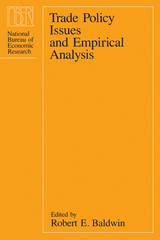
Trade Policy Issues and Empirical Analysis
Edited by Robert E. Baldwin
University of Chicago Press, 1988
Interest in U.S. trade policy has been stimulated in recent years by the massive American trade deficit, by the belief that intervention by foreign governments in international markets has given other countries a competitive edge over the United States, and by concern about the increase in protectionism among industrial countries. In turn, major analytical developments in international economics have revolutionized trade theory, broadening its scope both by introducing in a more formal manner such concepts as imperfect competition, increasing returns, product differentiation, and learning effects and by including the study of political and economic factors that shape trade policy decisions. This collection of papers—the result of a conference held by the NBER—applies these "new" trade theories to existing world cases and also presents complementary empirical studies that are grounded in more traditional trade theories.
The volume is divided into four parts. The papers in part 1 consider the problem of imperfect competition, empirically assessing the economic effect of various trade policies introduced in industries in which the "new" trade theory seems to apply. Those in part 2 isolate the effects of protection from the influences of the many economic changes that accompany actual periods of protection and also examine how the effects from exogenous changes in economic conditions vary with the form of protection. Part 3 provides new empirical evidence on the effect of foreign production by a country's firms on the home country's exports. Finally, in part 4, two key bilateral issues are analyzed: recent U.S.-Japanese trade tensions and the incident involving the threat of the imposition of countervailing duties by the United States on Canadian softwood lumber.
The volume is divided into four parts. The papers in part 1 consider the problem of imperfect competition, empirically assessing the economic effect of various trade policies introduced in industries in which the "new" trade theory seems to apply. Those in part 2 isolate the effects of protection from the influences of the many economic changes that accompany actual periods of protection and also examine how the effects from exogenous changes in economic conditions vary with the form of protection. Part 3 provides new empirical evidence on the effect of foreign production by a country's firms on the home country's exports. Finally, in part 4, two key bilateral issues are analyzed: recent U.S.-Japanese trade tensions and the incident involving the threat of the imposition of countervailing duties by the United States on Canadian softwood lumber.
[more]
READERS
Browse our collection.
PUBLISHERS
See BiblioVault's publisher services.
STUDENT SERVICES
Files for college accessibility offices.
UChicago Accessibility Resources
home | accessibility | search | about | contact us
BiblioVault ® 2001 - 2025
The University of Chicago Press









